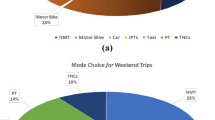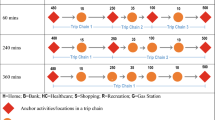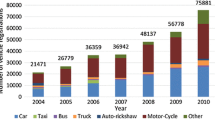Abstract
This study investigates the current and potential uptake of ridesourcing services, such as Uber and Careem, by the students of the American University of Beirut, Lebanon. A hybrid choice model is developed to predict the switching choice from traditional modes of transport to ridesourcing services for social/recreational trips made by these students in Lebanon. Data are provided by a web-based survey that includes revealed and stated preferences, besides demographics. It is found that the switching choice is determined by several observed factors, such as door-to-door travel time, waiting time for pick-up, and one-way fares, in addition to a latent variable that captures individual differences in perceptions and attitudes towards ridesourcing services. A base switching probability from traditional modes to ridesourcing services (calculated under a base scenario representing realistic values of the attributes of ridesourcing services if the latter were used to make the most recent social/recreational trip) is estimated to be 0.22. This probability is expected to reach 0.31 under a forecasted policy scenario consisting of 40% reduction in ridesourcing fares. Car users will be more sensitive to switch to ridesourcing services for their social/recreational trips if the ridesourcing fare reduction (40%) is associated with restricted parking conditions consisting of (a) 100% increase of parking fees from actual prices, and (b) 20-minute increase of parking search time and parking time from the actual car travel time. In this case, the resulting switching probability is expected to reach 0.38. By using the estimated choice model to forecast policy scenarios as such, this study can guide planners, policymakers, and service operators to prioritize effective policies in response to the behavioral change caused by the diffusion of innovative transport services and technologies. The study also contributes to a better understanding of the uptake of ridesourcing services in developing country contexts where public transport services are often inadequate.






Similar content being viewed by others
Notes
The questionnaire is available from the authors upon request.
Other considerations for selection of which statements to include in the measurement equations of the latent variable were used, such as benchmarking the resulting VOT with other local estimates (e.g., a model with all indicators was tested; however, the obtained VOT was significantly higher than that previously estimated for AUB students).
References
Al-Ayyash, Z., Abou-Zeid, M., Kaysi, I.: Modeling the demand for a shared-ride taxi service: an application to an organization-based context. Transp. Policy 48, 169–182 (2016). https://doi.org/10.1016/j.tranpol.2016.02.013
Allo Taxi: Allo Taxi. http://www.allotaxi.com.lb/ (2017). Accessed 9 Dec 2017
Aoun, A., Abou-Zeid, M., Kaysi, I., Myntti, C.: Reducing parking demand and traffic congestion at the American University of Beirut. Transp. Policy 25, 52–60 (2013). https://doi.org/10.1016/j.tranpol.2012.11.007
Belgiawan, P.F., Schmöcker, J.D., Abou-Zeid, M., et al.: Car ownership motivations among undergraduate students in China, Indonesia, Japan, Lebanon, Netherlands, Taiwan, and USA. Transportation (Amst) 41, 1227–1244 (2014). https://doi.org/10.1007/s11116-014-9548-z
Ben-Akiva, M., Lerman, S.: Discrete Choice Analysis. The MIT Press, Cambridge (1985)
Ben-Akiva, M., Walker, J., Bernardino, A.T., et al.: Integration of choice and latent variable models. In: Mahmassani, H.S. (ed.) In Perpetual Motion: Travel Behaviour Research Opportunities and Application Challenges, pp. 431–470. Elsevier, Amsterdam (2002)
Bierlaire, M.: PythonBiogeme: A Short Introduction. Report TRANSP-OR 160706. Series on Biogeme. Transport and Mobility Laboratory, School of Architecture, Civil and Environmental Engineering, Ecole Polytechnique Fédérale de Lausanne, Lausanne (2016)
Bierlaire, M., Fetiarison, M.: Estimation of discrete choice models: extending Biogeme. In: Proceedings of the 9th Swiss Transport Research Conference (STRC), Monte Verità (2009)
Careem: Careem fare calculator. https://www.careem.com/beirut/node (2017). Accessed 1 Dec 2017
Carranza, V., Chow, K., Pham, H., et al.: Life cycle analysis: Uber vs. car ownership. https://www.ioes.ucla.edu/wp-content/uploads/uber-vs-car-ownership.pdf (2016). Accessed 5 Dec 2017
Chalfoun, R.: Uber expands to Lebanon. http://news.arabnet.me/uber-expands-lebanon/ (2014). Accessed 1 Dec 2017
Chen, Z.: Impact of ride-sourcing services on travel habits and transportation planning. Master’s thesis, University of Pittsburgh (2015)
Choquet, J.: Uber and Careem are fighting over the promising taxi market in Lebanon. http://ecomnewsmed.com/article/2678/uber-and-careem-are-fighting-over-the-promising-taxi-market-in-lebanon (2017). Accessed 9 Dec 2017
Danaf, M., Abou-Zeid, M., Kaysi, I.: Modeling travel choices of students at a private, urban university: insights and policy implications. Case Stud. Transp. Policy 2, 142–152 (2014). https://doi.org/10.1016/j.cstp.2014.08.006
Dawes, M. Perspectives on the ridesourcing revolution: surveying individual attitudes toward Uber and Lyft to inform urban transportation policymaking. Master’s thesis, Massachusetts Institute of Technology (2016)
Dias, F.F., Lavieri, P.S., Garikapati, V.M., et al.: A behavioral choice model of the use of car-sharing and ride-sourcing services. Transportation (Amst) 44, 1307–1323 (2017). https://doi.org/10.1007/s11116-017-9797-8
Greenblatt, J.B., Shaheen, S.: Automated vehicles, on-demand mobility, and environmental impacts. Curr. Sustain. Energy Rep. 2, 74–81 (2015). https://doi.org/10.1007/s40518-015-0038-5
Grush, B., Niles, J.: Transit leap: a deployment path for shared-use autonomous vehicles that supports sustainability. In: Meyer, G., Shaheen, S. (eds.) Disrupting Mobility: Impacts of Sharing Economy and Innovative Transportation on Cities. Lecture Notes in Mobility, pp. 291–305. Springer (2017)
Hassanin, D.: UBER to launch transportation buses in Egypt: Nasr. In: Egypt Today. https://www.egypttoday.com/Article/3/23782/UBER-to-launch-transportation-buses-in-Egypt-Nasr (2017). Accessed 4 Dec 2017
Henao, A., Marshall, W.: A framework for understanding the impacts of ridesourcing on transportation. In: Meyer, G., Shaheen, S. (eds.) Disrupting Mobility: Impacts of Sharing Economy and Innovative Transportation on Cities. Lecture Notes in Mobility, pp. 197–209. Springer (2017)
Iacobucci, J., Hovenkotter, K., Anbinder, J.: Transit systems and the impacts of shared mobility. In: Meyer, G., Shaheen, S. (eds.) Disrupting Mobility: Impacts of Sharing Economy and Innovative Transportation on Cities. Lecture Notes in Mobility, pp. 65–76. Springer (2017)
Kaysi, I.A., Harb, M., Al-Dour, A.: Fleet reduction reform of Lebanese jitneys. In: 12th WCTR, 11–15 July 2010, Lisbon (2010)
Lemon, J.: Careem, Uber and Easy Taxi compete for customers in Middle East. https://stepfeed.com/careem-uber-and-easy-taxi-compete-for-customers-in-middle-east-3713 (2015). Accessed 1 Dec 2017
Lewis, E.O., MacKenzie, D.: UberHOP in Seattle: who, why, and how? Transp. Res. Rec. J. Transp. Res. Board (2017). https://doi.org/10.3141/2650-12
Mahmoudifard, S.M., Kermanshah, A., Shabanpour, R., Mohammadian, A.: Assessing public opinions on Uber as a ridesharing transportation system: explanatory analysis and results of a survey in Chicago area. Presented at the 96th Annual Meeting of the Transportation Research Board, Washington (2017)
Marten, L.: Assessing the demand for Uber. Master’s thesis, Northwestern University (2015)
McKenzie, G., Baez, C.: Uber vs. taxis : event detection and differentiation in New York City. Int. Conf. GISci. Short Pap. Proc. 1(1), 2–5 (2016). https://doi.org/10.21433/b3114zk9g37h
Meyer, G., Shaheen, S.: Disrupting Mobility: Impacts of Sharing Economy and Innovative Transportation on Cities. Lecture Notes in Mobility. Springer (2017)
OIRA-AUB (Office of Institutional Research and Assessment - American University of Beirut): AUB Fact Book. https://www.aub.edu.lb/oira/FactBook/Pages/default.aspx (2017). Accessed 20 Nov 2017
Rayle, L., Shaheen, S., Chan, N., et al.: App-based, on-demand ride services: comparing taxi and ridesourcing trips and user characteristics in San Francisco. Working Paper (2014)
Rayle, L., Dai, D., Chan, N., et al.: Just a better taxi? A survey-based comparison of taxis, transit, and ridesourcing services in San Francisco. Transp. Policy 45, 168–178 (2016). https://doi.org/10.1016/j.tranpol.2015.10.004
Schechtner, K., Hanson, M.: Shared mobility in Asian megacities: the rise of the apps. In: Meyer, G., Shaheen, S. (eds.) Disrupting Mobility: Impacts of Sharing Economy and Innovative Transportation on Cities. Lecture Notes in Mobility, pp. 77–88. Springer (2017)
Train, K.: Discrete Choice Methods with Simulation. Cambridge University Press, Cambridge (2009)
Uber Chicago: An Uber case study. https://uber-static.s3.amazonaws.com/web-fresh/legal/Uber_Chicago_CaseStudy.pdf. Accessed 4 Dec 2017
Uber Technologies Inc.: Get there, your day belongs to you. https://www.uber.com (2017a). Accessed 1 Dec 2017
Uber Technologies Inc.: Ya Beirut, Ya Sett Al Dunia…Your Uber has just arrived! In: Uber Blog. https://www.uber.com/en-LB/blog/beirut/ya-beirut-ya-sett-al-dunia-your-uber-has-just-arrived/ (2017b). Accessed 1 Dec 2017
Uber Technologies Inc.: Uber fare estimator. https://www.uber.com/en-LB/fare-estimate/ (2017c). Accessed 9 Dec 2017
Walker, J., Ben-Akiva, M.: Generalized random utility model. Math. Soc. Sci. 43, 303–343 (2002)
Walker, J., Wang, Y., Thorhauge, M., Ben-Akiva, M.: D-efficient or deficient? A robustness analysis of SP experimental designs in a VOT estimation context. Theory Dec. 1250, 1–16 (2017)
Acknowledgements
The authors thank all the students that answered the survey and three anonymous reviewers for their valuable feedback.
Author information
Authors and Affiliations
Contributions
RT: Literature review, survey design, descriptive analysis, modeling, manuscript writing. MA-Z: Overall coordination, guidance on survey design and modeling, manuscript editing
Corresponding author
Ethics declarations
Conflict of interest
On behalf of all authors, the corresponding author states that there is no conflict of interest.
Additional information
Publisher's Note
Springer Nature remains neutral with regard to jurisdictional claims in published maps and institutional affiliations.
Appendices
Appendix 1
See Table 8.
Appendix 2
Rights and permissions
About this article
Cite this article
Tarabay, R., Abou-Zeid, M. Modeling the choice to switch from traditional modes to ridesourcing services for social/recreational trips in Lebanon. Transportation 47, 1733–1763 (2020). https://doi.org/10.1007/s11116-019-09973-x
Published:
Issue Date:
DOI: https://doi.org/10.1007/s11116-019-09973-x




